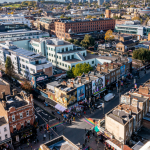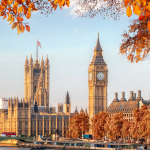Robathan is a veteran of London politics. Following a successful career in finance, she has served as an elected councillor for more than a decade, spending nine of those years holding Cabinet briefs on everything from adult social care and public health to housing, regeneration and finance. Good training for being Leader and responsible for, well, everything.
She sees development and the public realm as being at the core of the council’s purpose, noting that the built environment relates to everything from a “huge need” to deliver housing across all tenures, to the health of its economy, and to what she sees as the council’s primary responsibility – to care for its most vulnerable and in-need residents. We discussed a number of major regeneration schemes but Robathan tellingly pinpointed a relatively small project, tucked away in Maida Vale, as the one she is personally proudest of; Beachcroft House, a recently completed, council-led, PRP-designed scheme centred on a 84-bedroom nursing home; “we have to provide the highest level of accommodation and care for the residents that need it most”.
Robathan acknowledged that in the last 18 months her city has “suffered very heavily”. In normal times, Westminster has about a quarter of a million residents, plus almost a million workers, tourists and other visitors every day – but that phenomenal level of movement is still 52% down from pre-pandemic levels. That’s not simply a problem for the city itself: Westminster alone is home to 15% of London’s jobs and produces 10% of the country’s business rates revenue.
But she spoke of her pride in what Westminster’s councillors, officers, residents and businesses have achieved together, especially highlighting their success in providing accommodation for the homeless during lockdown. She also observed that the shift to remote working in many ways fostered even more collaboration within the council, as well as between the city and its external partners; “it has meant that we’ve been able to build a much closer dialogue than ever before, which is good.” Robathan was also eager to underline that the council has actually done much more than just firefighting over the past year and that “we simply couldn’t take our foot off the accelerator on key commitments”, including advancing its climate change agenda, its regeneration programme, and its plans for Oxford Street.
Robathan welcomed the fact that the pandemic has seen London’s boroughs work together, across party lines, more than ever before – she and neighbouring Camden Council’s Labour Leader Georgia Gould “meet regularly and work closely together on areas of shared interest to our two boroughs. We have a really good dialogue, as indeed I do with [the City of London Corporation’s] Catherine McGuinness, Elizabeth Campbell in Tory-held RBKC and all leaders across London”. She also feels that she has “managed to establish a good working relationship” with the Mayor of London and was adamant that “we need to be working as collaboratively as possible with all people involved in London government”. Robathan also confidently stated that Westminster has “always enjoyed a good working relationship with Central Government” and that “our voice is heard when we have concerns around planning, or other policies that will impact our city”.
Politics aside, Robathan argued that working with the private sector “goes to the heart of what we need to do – we have to work in partnership, as we all share an interest in making sure we have a city that is thriving and beautiful, and one that people can afford to live in … and there are some really great examples of that.” As an example, she cited the council’s efforts to provide no less than 266 rough sleepers with temporary hotel accommodation last year as “just the start” of a wider set of initiatives. This included working with the Westminster Property Association (WPA), Veolia and others to help those in temporary hotel accommodation to secure employment. We “would very much like that to continue” she said, adding that “we need to be working as a whole system, to make sure we are getting people into the right jobs”.
Robathan also pointed to Bouygues as an example of a valued partner that is central to delivering both the Ebury Bridge and Church Street projects. She highlighted having recently attended the “topping out” ceremony for the Luton Street project, a key component of the wider Church Street programme and “a really great scheme, which Bouygues are delivering for us alongside Linkcity, providing [aside from homes], community facilities, a new ‘green spine’, and works at ‘The Triangle’, which forms the really iconic heart of Church Street”.
The public-private relationship is “really critical” to the plans for Oxford Street too. Local landowners, including Grosvenor Britain & Ireland, The Portman Estate, and The Crown Estate in particular, are central to realising the council’s ambitions and the council itself has committed £150m to projects linked to the wider Oxford Street District Framework (OSD); “clearly, that needs to be the seed to draw in further investment from the private sector”. Robathan also emphasised that the OSD builds on extensive engagement with both residents and local businesses, “to make sure that we can work to deliver a scheme that delivers for everyone … a greener, cleaner space that has all the benefits of lovely, pedestrian-friendly areas to visit, but doesn’t pedestrianise the whole of the street” – which, as she noted, “was something that had faced significant opposition from our residents” in the past.
Key pieces of the council’s vision for Oxford Street and the West End are already falling into place. The alfresco dining scheme has helped produce “an additional 16,000 outside covers, about the equivalent of 300 new restaurants” to support the recovery of the hospitality sector and the Marble Arch mound is expected to open on 26 July. The City council’s “animation strategy”, aimed at luring visitors back into the area, has also come to life, with the support of the WPA and local Business Improvement Districts, while two new pedestrian-friendly “piazzas” at Oxford Circus should be in place by December.
Looking further ahead, Westminster is due to launch an international design competition for a longer-term revamp of the Oxford Circus area, in collaboration with RIBA. “There are very few places as iconic and well-known in the world – it’s right up there with locations like New York’s Times Square – so we want to be really ambitious”. Robathan is also looking to a “West End Futures board” to help answer critical questions about Central London’s future with a 10, 20-year horizon.
Indeed, specific projects aside, Robathan is keen to work with the property industry on “how we can build more sustainably, make our buildings more energy efficient, work together on better solutions for freight and waste, consolidate traffic on our streets, and improve air quality”. Robathan commended the WPA and its members for engaging with the council on the new City Plan 2019 – 2040, which was adopted earlier this year and for now “working very closely with us” on its draft Environmental Supplementary Planning Document (ESPD), which is currently out for consultation. “We want people to set their sights really high … because we know that in Westminster, 86% of our emissions come from our buildings … we want the ESPD to be gold-plated, to be as strong as it can be”.
Robathan did not shy away from the subject of next May’s borough elections. “Yes, as the Leader of a local authority I am now very focused on that.” Returning a Conservative administration in Westminster is, for Robathan, key to “delivering on all of these vital pieces of work we have been discussing today … I want to make sure we have the time to deliver on these commitments to our residents.”
As we concluded our conversation, Robathan looked at the bright side of an otherwise dark year for London: “This has been a real pivot year where we have been able to accelerate forward and push ahead and, as people have recognised, we can’t go back. It has been a time when we’ve really had to recognise what’s important for our residents and for our businesses, and deliver on those priorities. We’ve been able to work at a pace which we were never able to work at before; to cut through some of the red tape and deliver on what needed to be done – and we’ve been able to work much more closely with all of our stakeholders in Westminster. That’s going to be something very important to take forward, to make sure that we are all focused on what is vitally important for our city”.
This interview was conducted by London Communications Agency on behalf of the London Property Alliance as part of its curation of the monthly Central London Planning & Politics newsletter.
Read more from our London Leaders series here.


